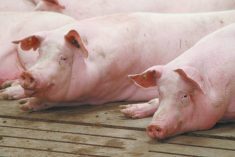Biotech experts say the public is likely willing to eat meat from gene-edited livestock if provided with the proper context
Glacier FarmMedia – Pigs with genes manipulated for disease resistance are in the works.
Gene-edited pigs resistant to porcine reproductive and respiratory syndrome (PRRS) could be a commercial reality as soon as 2026 in the United States, but one expert says it’s unclear how Canada’s regulatory system will respond.
“Based on the science that they’ve used so far to create the gene editing decisions that they’ve made, I would expect that gene editing in a pig should proceed without any additional risk assessments,” said Stuart Smyth, a researcher at the University of Saskatchewan who has specialized in biotechnology regulation.
Read Also

House ag committee to undertake several studies
The House of Commons standing agriculture committee has set its agenda for the coming months. Members began the fall sitting with a two-hour update on international trade
U.K. based PIC (Pig Improvement Company), in an Aug. 16 article in Farm Journal’s Pork website, said it anticipates its PRRS-resistant pig will get U.S. Food and Drug Administration approval next year and could be commercialized as soon as 2026.
The disease is an economically damaging animal health threat in many swine-producing areas of the world. It can cause reproductive failure, respiratory disease, fever, lethargy, vomiting and other symptoms. There’s no direct treatment.
The virus latches onto part of a protein in a pig’s immune system, starting a chain reaction that results in infection, PIC’s website says. The company has deleted that part of the protein, so there is nothing for the virus to latch onto.
It’s something the Manitoba pork sector keeps a close eye on, the Manitoba Pork Council said. At present, the state of porcine reproductive and respiratory syndrom in the province is considered stable.
In the article, PIC said it is working on regulatory approval in Canada alongside the U.S. and several other countries.
Currently in Canada, gene-edited plants don’t require additional safety checks if the final plant product doesn’t contain foreign DNA. Similarly, gene editing can’t introduce or increase a known allergen or toxin of key nutritional composition, and it can’t change the food use of the plant.
Smyth said the science that led regulators to that decision could also be applied to animals.
“As long as what’s being put forward doesn’t have any difference in risk profile, it would be difficult to imagine why you would need to have a different regulatory system,” he said.
However, discourse has largely steered away from gene-edited animals.
“There really hasn’t been any development, in part, I think because there’s no big companies,” Smyth said.
Crop science has typically had the backing of multi-national giants like Bayer and Syngenta, he added. They can push the federal government to develop the needed regulatory system.
This may be the reason most recent research into gene editing pigs has been for the health sector.
Pigs have enough similarities to humans to make them likely candidates for xenotransplantation — the transplant of animal tissue, organs or cells into humans, explained McGill University researcher Vilceu Bordignon. He discussed gene-editing research in pigs at the Swine Innovation Porc event in January 2023.
Researchers have edited pig genomes to make them more compatible with humans, he said. One such pig, the GalSafe, also received FDA approval for human consumption.
Scientists have worked or are working on other agricultural gene-editing projects, Bordignon said. He named projects to develop pigs resistant to African swine fever and Senecavirus A, gene editing for production traits like lean body mass and hypoallergenic meat, and animal welfare projects such as genetic castration.
“Powerful tools for new breeding technologies are right there, and it’s up to the society and the producer to decide if they want or not (to) use them.”
Health Canada’s ruling on gene-edited plants drew fire from biotechnology skeptics and anti-GMO groups. The concern is that the decision would reduce safety and transparency in the food system.
The organic industry also fears crops could be contaminated by cross pollination with gene-edited crops. Gene editing is not allowed under Canadian organic standards.
Smyth, who was vocal about his approval of the Health Canada decision at the time, said consumers are less reluctant than often portrayed.
“The public’s very supportive of gene editing when you provide context on how it contributes to sustainability.”
The same could be true if gene edits were explained in terms of animal welfare advancements.
“It’s taking time to provide that context.”
As for farmers, Smyth said they’re typically open to innovation if convinced it would improve profitability.


















